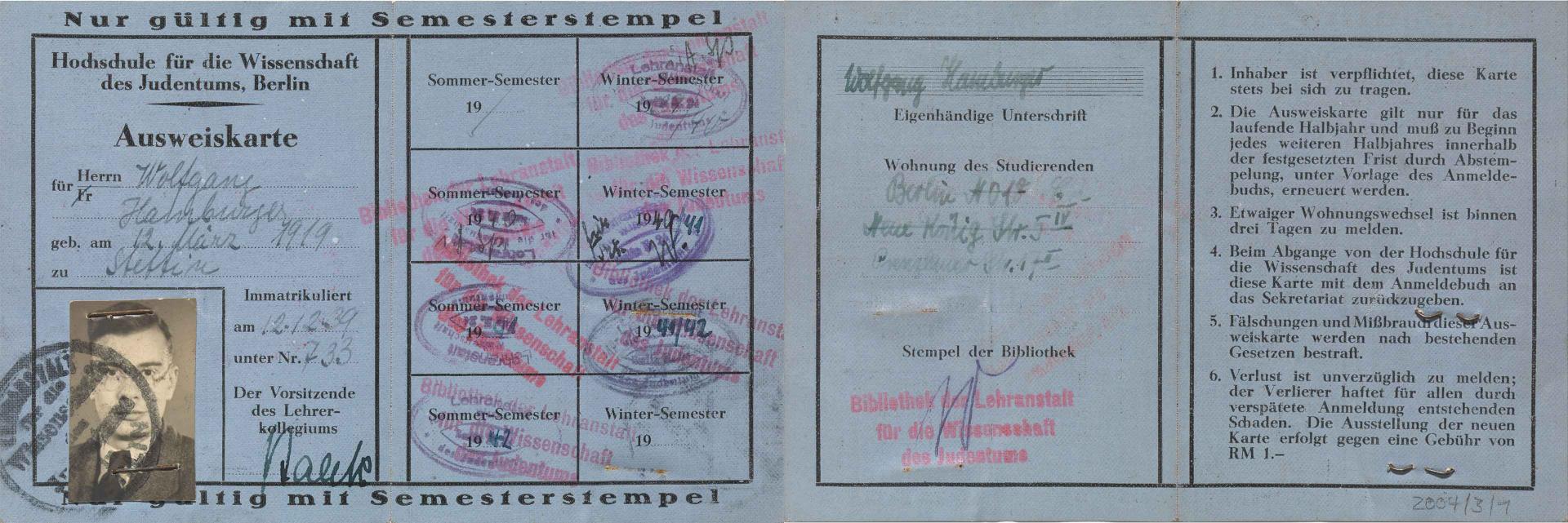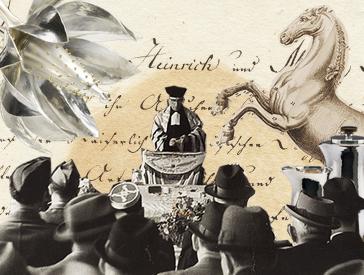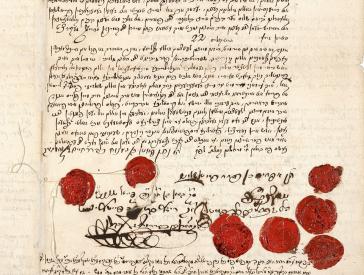Rabbinical studies in the capital of Nazi Germany
Identification card for Wolfgang Hamburger, College for the Science of Judaism, Berlin, 1939–1942, gift of Wolfgang Hamburger, 2004

Outside and inside pages of the Identification card; Jewish Museum Berlin, accession 2004/3/1, gift of Wolfgang Hamburger, photo: Jens Ziehe. Further information on this document can be found in our online collections (in German).
The College for the Science of Judaism was among the most important institutions established by German Jews in the second half of the 19th century. Opened in Berlin in 1872, it functioned for more than 70 years as the leading institute for academic study of Judaism and training of liberal rabbis. One of the institution’s last students was Wolfgang Hamburger, whose college ID we see here.
Beginning studies during the Second World War
Born in Stettin in 1919 to a Jewish father and a Protestant mother, Hamburger began his rabbinical studies in December 1939, three months after the start of the Second World War. The ID card bears stamps attesting to his continuous enrollment from the winter semester of 1939 to the summer semester of 1942. Interestingly, the institution is referred to as “Hochschule” (“College”) on the ID card, even though the authorities forced it to change its name to “Lehranstalt für die Wissenschaft des Judentums” (“Academy for the Science of Judaism”) in 1933, as the wording on each stamp indicates. In addition to Hamburger’s biographical data, on the inside pages of the document we find Rabbi Leo Baeck’s signature. He was head of the teaching staff. As president of the Reich Representation of German Jews, and later its offshoot, the Reich Association of Jews in Germany, he was the leading figure of German Jews during the years of oppression and persecution.
It is difficult to imagine what it must have been like to take up rabbinical training during wartime in the capital of Nazi Germany. Synagogues and prayer rooms had been destroyed only a year earlier, and almost all Jews in Germany were desperately seeking a way out of the country. Moreover, Hamburger’s studies took place under an additional major complication: Starting in 1941, he was forced to work for the metalworks company Ehrich & Graetz.
Closure of the academy
On July 19, 1942, the Nazi regime ordered the closure of the academy. Hamburger kept his ID card despite the stipulation on the back that it had to be surrendered when he left the institution. At Baeck's insistence, Hamburger left Berlin and returned to Stettin in December of the same year. While the last faculty and students of the college were almost all deported in the months before and after its closure, Hamburger escaped this fate because his mother was “Aryan.” He did, however, have to continue doing forced labor in the city of his birth. In the process, he suffered a severe back injury, but he survived the war.
Emigration to the USA
In 1945, Hamburger began studying theology and philosophy at Berlin University, and he also worked as a rabbinical candidate with the Jewish Community. In 1947, he emigrated with his mother to the USA and continued his rabbinical studies at Hebrew Union College in Cincinnati. After his ordination in 1952, a long and fruitful career as a rabbi followed in six different cities. Hamburger ultimately settled down in St. Joseph, Missouri with his wife, Susan, who had fled Breslau with her parents in 1940. In 2004, Hamburger donated his extensive estate to the Jewish Museum Berlin. He died in 2012.
Aubrey Pomerance, Archive director
Citation recommendation:
Aubrey Pomerance (2021), Rabbinical studies in the capital of Nazi Germany. Identification card for Wolfgang Hamburger, College for the Science of Judaism, Berlin, 1939–1942, gift of Wolfgang Hamburger, 2004.
URL: www.jmberlin.de/en/node/8475




